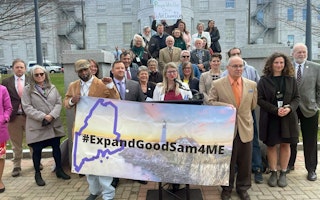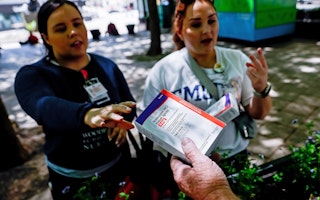HIV Activists Beaten and Arrested in South Korea
By Tamas Varga
During the opening ceremony of the 10th International Congress on AIDS in Asia and the Pacific (August 26-30) in Busan, South Korea, several international and Korean activists went on a peaceful march to protest against intellectual property provisions in a number of free trade agreements (FTA). Health and human rights experts fear that these provisions will threaten access to life-saving medicines, including generic anti-retroviral treatment.
South Korea signed a free trade agreement with the European Union and the United States; however, the U.S.-Korea FTA has yet to be ratified by Parliament and activists were hoping the march would highlight the danger to access to medicines. Activists also wanted to voice their concerns about the Korean government's discriminatory treatment of people living with HIV—many HIV and drug user activists were unable to attend the conference after being turned away at the airport because of their HIV positive status.
As the Korean Minister of Health was speaking, activists rose with banners to register their protest against the agreements being negotiated across the region with the European Union and the United States. Even though the subsequent march was peaceful, plain-clothed government security personnel arrested many activists, several were badly beaten. According to a report by the International Treatment Preparedness Coalition (ITPC), at least three people were hospitalized. The police came to the hospital and threatened them with criminal charges. Suh Yeon Chang, a human rights lawyer working with the Korean Public Interest Lawyers Group GON G-GAM, was arrested without explanation, in violation of the South Korean criminal law. It is unclear what—if any—further legal measures will be taken against the protesters.
International activists are extremely concerned about the fate of their Korean colleagues once the conference is over. A number of AIDS groups—APN+, ITPC, the Asia Pacific Network of Sex Workers, Australian Federation of AIDS Organizations and Act Up-Paris—have called on UNAIDS and the Global Fund to follow up and ensure there is no further harassment or police action against South Korean activists.
Despite these negative events outside, the conference highlighted many crucial issues facing the region. HIV infection continues to be a pressing problem for people in Asia, especially injection drug users. Many countries in the region limit needle exchange or substitution treatment programs due to restrictive drugs policies. To raise awareness of this issue, the Open Society Foundations' Global Drug Policy Program co-hosted a drug policy session with the Asian Harm Reduction Network at the conference that highlighted the need for a major debate on today’s prohibitive drugs policy regime, among the recommendations in a report released by the Global Commission on Drug Policy. The session was well attended, and the participants, mostly from Asia, showed a clear interest in the commission’s message.
Until September 2013, Tamas Varga was a program officer with the Open Society Global Drug Policy Program.


